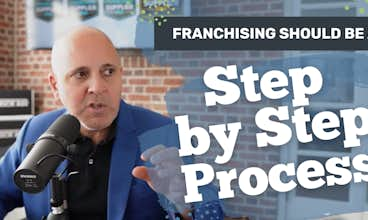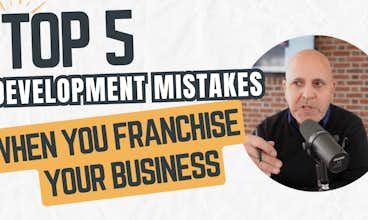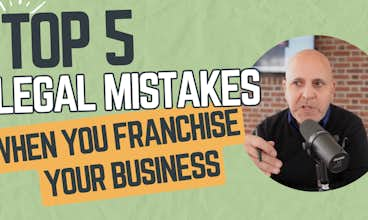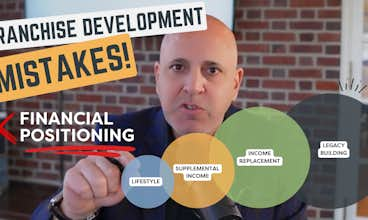Franchising and trademarks go hand-in-hand. When you franchise your business, a primary legal right that you will be granting to your franchisees is the license and right to use your trademarks. Franchisees will replicate your business model, and in doing so, will use your trademarks. As franchisor, you will instruct your franchisees as to how they may and may not use your trademarks, and it’s your obligation to make sure that your trademarks are registered with the United States Patent and Trademark Office ("USPTO") and protect your trademarks from any infringing uses by competitors. Since trademarks are so important to franchise systems, FDD Item 13 is specifically devoted to disclosing information about your trademarks to prospective franchisees.
Below, we review the basics of franchising and trademarks, what you need to know about your trademarks as a franchisor, trademark registration, and trademark protection.
What Is a Trademark?
A trademark is a word (i.e., your business name), symbol (i.e., your logo), or both (i.e., the name of your business combined with your logo) that is used to identify your business, to identify the goods you sell, and to identify the services that you provide. A trademark may also include slogans that you use in the identification of your business.
Is Your Trademark Legally Protected?
Just because you have a trademark to identify your business doesn’t mean that you own it or that it is legally protected. Ownership and legal rights for a trademark come about through two sources:
- Through your actual usage of the trademark and the rights that you obtain through this usage, known as a common-law trademark,
- Through registration of the trademark with the USPTO and the rights that you obtain through this usage, known as a federally registered trademark. Trademark rights obtained through a federal registration are much stronger than rights obtained through common-law usage.
Does Your Trademark Have Legal Protection?
In addition to evaluating "how" you obtained your trademark rights, it is important to evaluate the strength of your trademark. Under the law, a trademark that is "descriptive" is not protected by law, while trademarks that are “arbitrary” or “suggestive” have the capacity for legal protection.
- A descriptive trademark describes the products that you sell or the services that you provide. Examples of a descriptive trademarks include "Brick Fired Pizza" for a pizza restaurant or "Rapid Printing" for a printing business.
- Trademarks that are arbitrary and have nothing to do with the products or services of your business are afforded the highest level of legal protection. Examples of arbitrary trademarks include "Apple" for computers and "H&R Block" for tax preparation services.
- Trademarks that are suggestive fall between descriptive and arbitrary and are afforded some legal protection.
The Trademark Registration Process
Protection of your trademarks will require the filing of a trademark registration application with the USPTO. The trademark registration application will include a sample of your trademark, identify the owner of the trademark, identify the date that you first used the trademark in commerce, and list the classification codes for your business. Once a trademark application is filed, there will be a waiting period until the application is assigned to an "examining attorney." The examining attorney will conduct trademark searches to determine whether or not someone else already registered the trademark, and evaluate the legal strength of the trademark to determine if it is legally protectable.
If the examining attorney believes the trademark is descriptive, she will issue what is known as an "office action letter" where she indicates that she has refused to grant registration. Part of the trademark registration process will involve responding to office action letters, where your franchise lawyer addresses issues raised by the examining attorney.
If your trademark application passes review by the examining attorney, your application will be published in what is known as the Trademark Official Gazette, which serves as notice to the world that you are claiming protection for your trademark. If there is no opposition to the publication of your trademark, then registration will eventually be granted. The typical time period for obtaining USPTO trademark registration is approximately eight months from the date of your initial registration application.
Trademark Disclosures in Your FDD
FDD Item 13 is specifically devoted to disclosures about a franchisor's trademarks. Within Item 13, a franchisor must disclose each principal trademark, whether or not each trademark is registered with the USPTO, the status of all USPTO trademark applications, and the renewal status of each trademark. Additionally, within Item 13 a franchisor must disclose "the existence of any pending litigation, settlements, or superior rights that may limit a franchisee's use of the trademark." If a trademark is not registered with the USPTO, Item 13 must include the following trademark registration disclaimer:
We do not have a federal registration for our principal trademark. Therefore, our trademark does not have as many legal benefits and rights as a federally registered trademark. If our right to use the trademark is challenged, you may have to change to an alternative trademark, which may increase your expenses.
As a franchisor, it is critical that you evaluate and protect your trademarks at the franchise development stage, through the launch stage of your franchise system, and on an ongoing basis as your franchise system grows.
Trademark Litigation
Lawsuits involving trademark infringement are, most commonly, governed by federal law. The Lanham Act provides a federal cause of action for trademark infringement. Franchisors possess claims for trademark infringement against any third party (including former, and possibly, existing franchisees) who use a "word, symbol, or device" to "cause confusion" regarding the source of origin of the products or services offered by the third party. When assessing a potential lawsuit involving trademark infringement, franchisors must consider the following:
- Federal trademark registration is critical but not a guaranty. As discussed earlier, federal USPTO registration affords a number of legal benefits and rights that will enhance a franchisor's ability to protect and defend its trademarks. However, federal registration is no guaranty, and prior to commencing any litigation, you should find out whether or not the prospective defendant claims any preexisting common-law rights to the mark. Although unregistered, a third party's preexisting common-law usage of a mark may serve as a defense to an infringement action. Also, this defense may weaken the strength of your mark and lead to many collateral issues. So prior to commencing any trademark litigation, it is critical to understand and evaluate any claims of preexisting use.
- You must prove that your trademark is entitled to protection. To establish a claim for trademark infringement, you must establish that (a) your trademark is protectable (i.e., that the trademark is not merely descriptive), and (b) the defendant's use of an identical or similar mark is "likely to cause confusion" among consumers. Remember, not every mark is protectable.
Summary: Putting It All Together as a Franchisor
Trademark factors you should know and understand include:
- USPTO Registration Is Required
Your trademarks eventually need to be registered with the USPTO. As a franchisor, your entire system will be growing around your trademark and brand. Common-law trademark rights are weak and may be inferior to the rights of others who may (in a different part of the country) have adopted a similar or identical trademark. When you obtain USPTO registration of your trademark, you obtain trademark rights that are nationwide and superior to everyone in the country who may later attempt to utilize the same or a confusingly similar trademark. - Conduct Trademark Searches Early On
If you are at the franchise development stage, it’s critical that your franchise lawyer conduct trademark searches to determine if your trademarks are protectable. If another business in the same industry has previously filed or obtained registration of a trademark that is the same as yours or confusingly similar to yours, then you will not obtain registration and you will be required to establish an alternative trademark and trade name. If you have already launched your franchise, it is important to ensure that you obtain registration and closely monitor the status of your trademark registrations. - You Must Police Your Trademarks
As a franchisor, you must police your trademark and monitor its usage by other businesses. Your business and brand will be expanding throughout the country, and with that expansion comes additional scrutiny. Understand that even if your trademark is registered, your rights may be inferior to a local business with a common-law interest if that local business was in operation prior to the date of your USPTO registration. Prior to sending cease-and-desist notices to what you believe to be third-party infringers, your franchise lawyer should evaluate the third party's usage to determine if they possess any preexisting rights. If you license and grant a franchise in a territory where a third party possesses superior common-law rights, you may be exposing your franchise system and your franchisee to potential trademark infringement claims.








